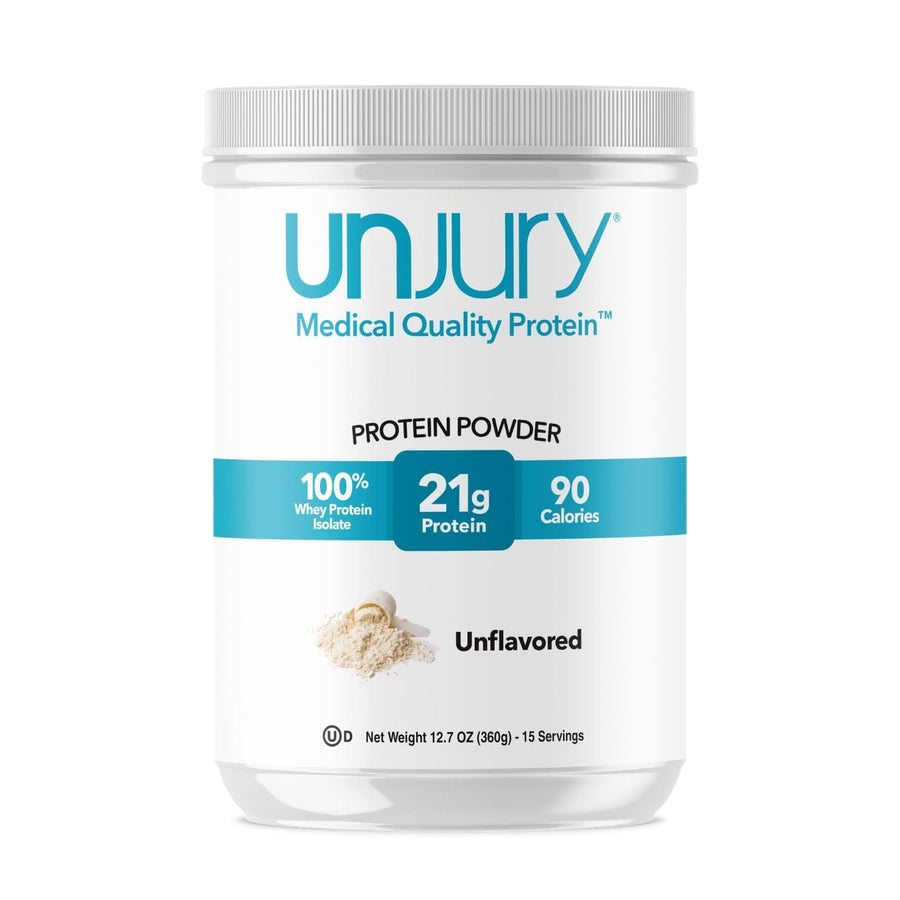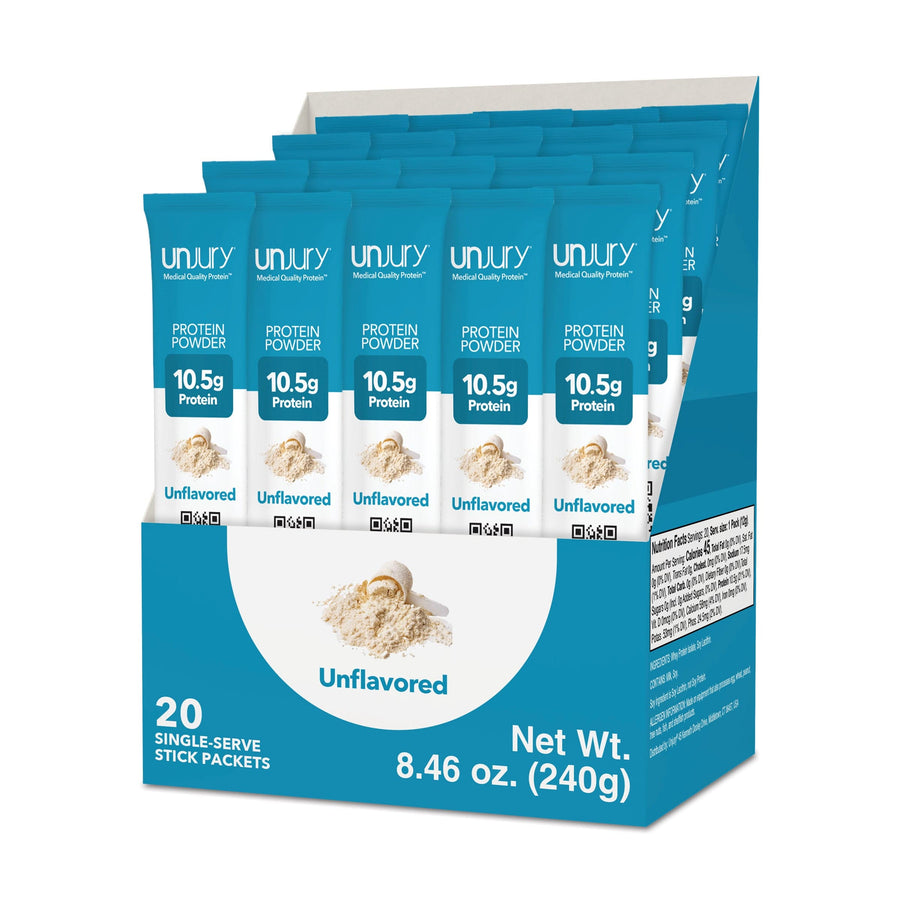Why Cancer Patients Need Protein
Proper nutrition is crucial for cancer patients to maintain strength and well-being. Many face appetite changes and dietary restrictions, causing nutrition issues and muscle loss. Due to these challenges, ensuring an adequate intake of high-quality protein is essential.
Studies reveal that a significant portion of cancer patients encounter nutrition-related issues, leading to muscle loss and decreased stamina.1 High-quality protein foods and supplements like Unjury® whey protein isolate can help support recovery by aiding tissue repair and providing energy.2*
In this blog, we discuss the significance of high-quality protein intake and explore how individuals undergoing cancer treatment can optimize their nutritional intake for better quality of life.
High-Quality Protein Is Vital for Cancer Patients
Feeling strong during cancer treatment and living a good quality of life after treatment requires healthy eating and staying nourished. However, that can be challenging when you don’t feel well.
Many patients experience changes in appetite during treatment, while others have dietary restrictions that make it difficult to eat whole foods. Studies show that three out of five patients with cancer will experience nutrition issues, making it challenging to preserve lean muscle and feel strong throughout treatment.1,3
In fact, up to 40% of cancer patients have weight loss before their initial cancer diagnosis and 40-80% of cancer patients experience malnutrition during treatment. Malnutrition and muscle loss decrease strength and stamina, and undernourished patients are more likely to experience fatigue and a weaker immune system.3,4
When weight is lost during cancer treatment without sufficient high-quality protein and exercise, weight can be regained later, which can be more fat stored instead of replenishing muscle mass.5 When body composition is made of more fat than muscle, it can lead to other metabolic issues in the future.
How Unjury Whey Protein Can Help During Cancer Treatment
The high-quality whey protein isolate in Unjury products supports wound healing, recovery from surgery, and muscle strength during treatment.*
Here’s how:
- After chemotherapy and radiation, amino acids in protein rebuild and repair tissues and cells, including blood and immune cells.6,7
- Unjury delivers the highest quality protein, leading to better taste and tolerability for each patient.
- Good nutrition can affect how you feel and respond to treatment. Adding Unjury protein to your diet can reduce the risk of muscle loss and keep you feeling stronger so you can fight harder.*
- Finally, high-quality protein helps you maintain energy to stay active during treatment, which means less fatigue and better quality of life after treatment.
How Much Protein Do You Need Each Day?
It’s a little different for everyone, depending on size, gender, activity level, and health goals, but there is a good rule of thumb to follow that is based on medical research.8
That is 30 grams of high-quality protein three times daily (breakfast, lunch, and dinner), also known as “30-30-30.”
That amount of high-quality protein will give you all the amino acid-building blocks you need in the right proportions for protecting and restoring tissue.
When Should I Use Protein Shakes?
Protein shakes and soups are the best alternatives to whole-food protein sources when people can’t eat enough animal protein throughout the day to meet their needs after surgery or an illness. Milk, eggs, chicken, fish, beef, and tofu are all high-quality protein sources, but when you have loss of appetite during treatment, it’s challenging to reach your protein goals with whole-food protein sources alone.
The whey protein isolate in Unjury products has an excellent amino acid profile or protein digestibility-corrected amino acid score (PDCAAS) of 100. It is high in leucine, which medical research shows is particularly important for stimulating muscle development.9
Which Flavors Are Best for Cancer Patients?
It’s common for patients to lose interest in sweet products and some people are sensitive to temperature with treatment. So, it’s good to have options like high-protein soup broths as an alternative to traditional sweet protein shakes.
One of the most popular flavors recommended by cancer registered dietitians is unflavored. It’s the most versatile protein powder available and you can add it to anything that sounds appealing when your appetite changes. Unjury Unflavored Whey Protein Powder blends well into smoothies, yogurt, oatmeal, mashed potatoes, veggie dips, sauces, and baking mixes.
Summary
Proper nutrition is vital for supporting cancer patients' strength and well-being during and after treatment. Many face challenges like appetite changes and dietary restrictions, making it crucial to ensure enough high-quality protein intake.
While protein is essential for maintaining muscle and strength, a balanced and healthy diet with fruits, vegetables, healthy fats, and grains is also important for overall nourishment and recovery.
Prioritizing high-quality protein intake is key to empowering cancer patients to optimize their health and quality of life throughout their treatment journey.
References
1. Clemente-Suárez VJ et al. Int J Environ Res Public Health. 2022;19(8):4604.
2. Wang X et al. Evid Based Complement Alternat Med. 2022;2022:4231516.
3. Muscaritoli M et al. Oncotarget. 2017;8(45):79884–79896.
4. Coble Voss A, Williams V. Oncology Nutrition for Clinical Practice. 2nd Ed. Academy of Nutrition and Dietetics. 2021.
5. Byun M et al. Int J Environ Res Public Health. 2021;18(17):9313.
6. Anderson PM et al. Nutrients. 2020;12(6):1675.
7. Muhammad N et al. Cells. 2020;9(8):1904.
8. Lonnie M et al. Nutrients. 2018;10(3):360.
9. Breen L et al. J Physiol. 2012;590(Pt 9):2065–2066.
*These statements have not been evaluated by the Food and Drug Administration (FDA). These products are not intended to diagnose, treat, cure, or prevent any disease.
This blog is for information and education purposes only. This information is not intended to substitute professional medical advice, diagnosis, or treatment. Please consult with a qualified healthcare provider with any questions in regard to a medical condition. A qualified healthcare professional can best assist you in deciding whether a dietary supplement is suitable based on your individual needs.












